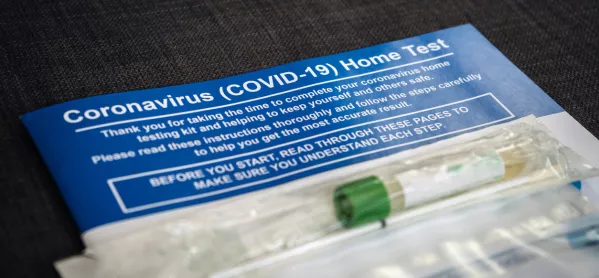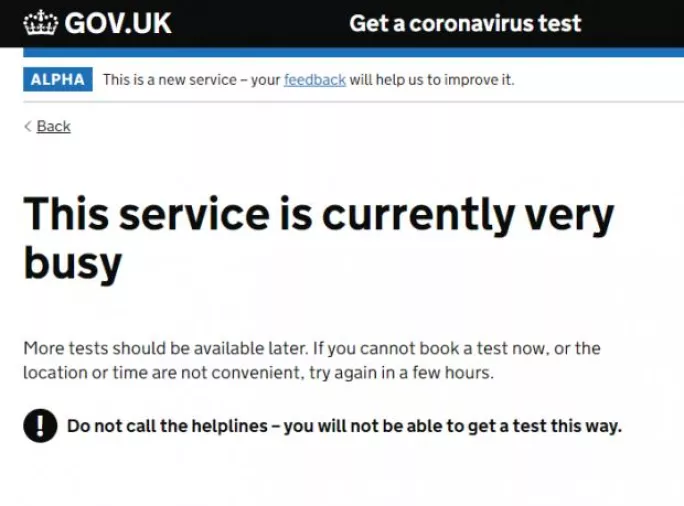
- Home
- Is this an answer to the school Covid-19 testing chaos?
Is this an answer to the school Covid-19 testing chaos?

My personal experience with the COVID-19 testing system began with a poorly child and this ‘all too familiar’ message.

It is now apparent that the UK testing system is in crisis. It’s a typical supply and demand scenario, whereby the demand for tests has increased substantially and supply has been thwarted by ‘bottlenecks’ in labs due to individual sample processing times.
The direct impact on schools is evident.
Read more:
Coronavirus: Are there any right answers on Covid-19 for schools?
School safety: What happens if a student tests positive for Covid-19?
Restrictions: How to prepare for local lockdowns
Within the first few weeks of schools reopening, children and teachers are, unsurprisingly, presenting a range of typical symptoms for this time of year - rhinorrhoea, coughs, fevers, gastrointestinal symptoms etc. and the lack of accessibility to tests has forced those affected into isolation with their families.
All teachers can corroborate the impact this has had on attendance - just two weeks in.
With the imminent arrival of seasonal infections, schools need an alternative solution to help them stay open.
This solution could be pooled PCR testing (also called group or batch testing).
What is pooled PCR testing?
This is an amended approach to current PCR tests. Instead of testing individuals - one at a time- it would involve taking swab samples from a small group or bubble, which would be mixed together in one tube and tested as a single sample.
In the event of a negative result, the entire bubble would be clear and free to resume daily life.
A positive pooled PCR result could proceed in one of two ways:
- All in the batch are tested individually to identify the infected person
- For a large group size, mini pools at half the size could be tested again, following which the mini pool with a positive result could be individually tested to identify the infected person
Pooled PCR testing has the potential to be routinely used in schools as an efficient, rapid, cost-effective alternative to the current testing format.
In action
Imagine a classroom or bubble of 30. One person in this bubble is positive for SARS-CoV-2. Here are the potential next steps:
- Divide the bubble into 5 groups of 6 - each group is now referred to as a pool
- Take a swab sample from each member of the 5 separate pools
- Combine the samples from the 6 members of each pool into one tube. You now have 5 samples to test instead of 30 samples
- One of the pools tests positive as expected. This pool with 6 members goes into isolation. The remaining 4 pools are clear
- The 6 members in the positive pool are individually tested. The positive individual is successfully identified
Crucially, 11 tests are used in total instead of 30, each member of the bubble has been screened and the number of isolations is kept to an absolute minimum to allow students to remain in school and schools to remain open.
Limitations
With any test there are caveats. Pooled PCR tests are no exception.
Concerns have been raised about individual sample quality and the dilution of samples. However, it is important to highlight, that pooled testing is not a novel idea and has been used successfully in large, predominantly asymptomatic populations to test for STDs and also screen blood in banks for Hepatitis B/C and HIV. Pooled PCR tests are already being implemented in the US for COVID-19 testing in a small capacity too.
The primary and most significant limitation to routine pooled PCR testing in schools is likely to be parental consent. Current methods of obtaining samples through nose and throat swabs can be unpleasant at best. Would parents approve of their children being subjected to weekly/fortnightly swabs?
I conducted a small-scale survey to gauge thoughts, although this would demand repeating with a larger, more representative cohort:
- 31 per cent would agree for their children to be routinely swabbed if this prevented endless isolations in the absence of sufficient tests and allowed for schools to remain open
- 63 per cent disliked the idea of swab tests on their children, but would consider routine saliva-based tests if this option was to become available in the UK
- 6 per cent would require more information before committing to a decision
Evidently, saliva-based tests are currently being trialled in the UK, both in the community and in an educational setting. With studies showing comparable results to swab tests, saliva-based testing, which is simpler, safer and less invasive, could underpin the next generation of rapid testing.
With a solution to COVID-19 testing being weeks away at best, tests being rationed, and prioritisation lists to be published to prevent the backlog of tests in labs, schools are likely to take the brunt.
Therefore, pooled PCR tests, ideally saliva-based, offer a very real solution and should be meticulously considered as a routine, rapid and cheaper method of testing in schools.
Shetal Arjan-odedra is a former virologist at King’s College London and is now training to be a teacher.
Register with Tes and you can read five free articles every month, plus you'll have access to our range of award-winning newsletters.
Keep reading for just £4.90 per month
You've reached your limit of free articles this month. Subscribe for £4.90 per month for three months and get:
- Unlimited access to all Tes magazine content
- Exclusive subscriber-only stories
- Award-winning email newsletters
You've reached your limit of free articles this month. Subscribe for £4.90 per month for three months and get:
- Unlimited access to all Tes magazine content
- Exclusive subscriber-only stories
- Award-winning email newsletters


